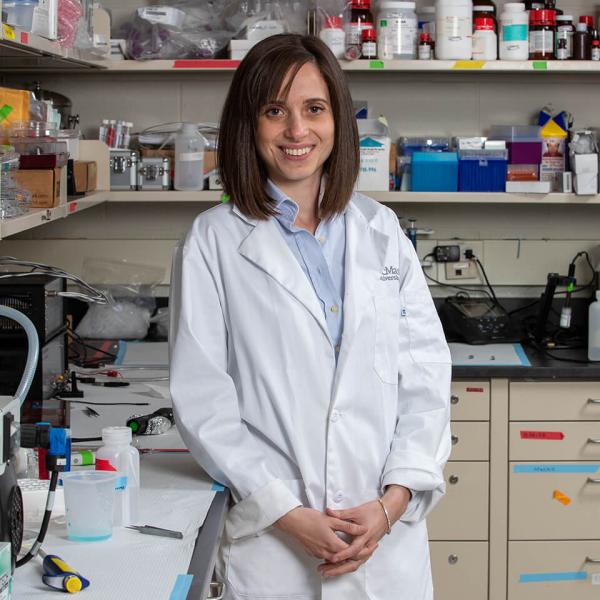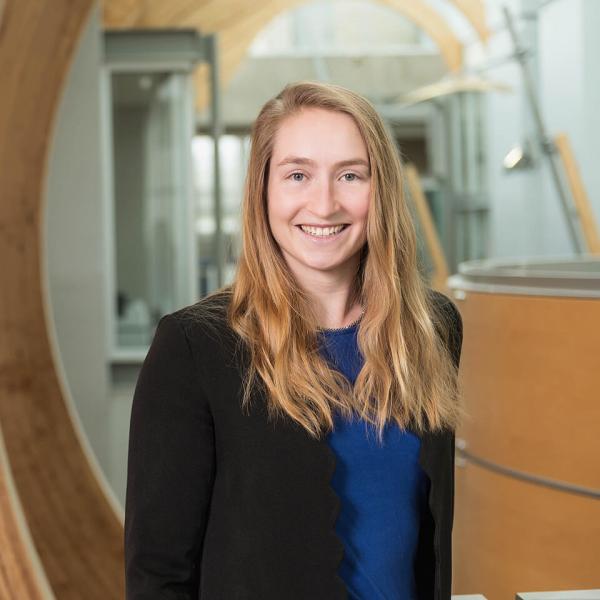Host:
This is a Canada Foundation for Innovation podcast.
(Music in)
Hello and welcome to 10,000 ways. This is a podcast about curious researchers, leading-edge science and the joys of discovery.
Carla Prado:
My name is Carla Prado. I’m a registered dietitian and a professor in human nutrition at the University of Alberta.
I work in body composition research which relates to the different amounts of muscle and fat that people have in their bodies and low muscle mass is a very strong and independent predictor of morbidity and mortality in a variety of conditions and disease states.
Host:
Our podcast gets its name from Thomas Edison who said, “I have not failed. I’ve successfully found 10,000 ways that will not work.”
(Music out)
(Music in)
Host:
Researcher Carla Prado arrived on the doorsteps of the University of Alberta on a cold March 2nd in 2004 with nothing and no one, but the man she just married and their two suitcases. Carla called the move, “A leap of faith.”
Today, she oversees a team of fifteen researchers, administrators, and students. Her focus is nutrition and the impact it can have on our health, particularly patients with cancer. She believes in community and embraces the importance of sharing her knowledge.
Carla likes to use analogies to help people better understand the science. Three of her favourite analogies begin with wildfires, tornadoes and even the yellow brick road.
But before we travel down that particular path, we’ll let Carla tell you about her leap of faith, and the path that brought her to Canada.
(Music out)
Prado:
I’m originally from Brazil
(Music in)
(Music out)
I’ve always been passionate about health and sciences, and I was trying to find which program would fit better when I was a high school student. I needed to choose what I was going to study at university, and I struggled a little bit in deciding what to do. I actually started a law degree, but it took me one month to realize that was not for me and at that time I was waiting for the results of another university where I applied to the nutrition program.
(Music in)
So I became more passionate about the study of nutrition around the third year of my university degree. Second year I was already studying some very, very interesting areas related to nutrition and health, but you can actually see from my transcripts how much more interested I was in all of that.
So towards the end it was obvious that I had to do a master’s degree and I reached out and actually was able to find a potential supervisor in the United States but I only had less than a month to prepare for all of the exams, their GRE [Graduate Record Examination] tests but long story short it didn’t work out and then I went to an English as a second language fair and I found out about Canada’s universities, specifically the University of Alberta.
So I have a fairy tale story because I didn’t have anyone to recommend me to help write to the professor. So how could I stand out? Right? It was very difficult to stand out. It was really my husband, we were recently married, and he said, “They need to know you. No one will take a student they don’t know.” And it sounds like a crazy story but really, we sold everything we had. We registered as English as a second language students so we could have visas to come to Canada and it was March 2nd. It was minus 20 degrees, and I knocked on this professor’s door and I said, “I’m here to work with you.”
(Music out)
Host:
Traditional ways used to evaluate health have changed considerably since Carla’s arrival on that cold day in 2004. For example, many of us still step on the scales first thing in the morning. While this measurement can provide us with a very precise indicator of weight, it really doesn’t say much about our health. Body mass index, or BMI, has also been used as an indicator of health, but it doesn’t factor in a variable like muscle mass, which changes as we age. Body composition, however, gives a far more accurate measure of fat and our health.
(Music in)
Prado:
I’m very passionate about studying body composition. Body composition is when you look at a body weight, but you just don’t look at that bulk of body weight. Where is the body weight coming from? What are the different proportions of muscle and fat and how are they related to health? I work with patients with different conditions but I’m particularly focused on patients with cancer.
People with low muscle mass who have cancer. They have higher chances of getting severe toxicity to chemotherapy. They have poorer quality of life. If they are operated on, they have a higher risk of developing surgical complications. If they’re hospitalized, they have a greater or higher risk of having a greater length of hospital stay. And again, even survival is shorter.
If you have low muscle mass, you can have people with stage one cancer, which is curative versus stage four cancer, which is advanced cancer. Yet low muscle is an independent predictor of survival for this patient. It’s very important and it was a huge learning curve for us understanding why muscle would be important in the context of such a detrimental health condition.
(Music out)
Prado:
The concept of body composition wasn’t a priority in people’s minds when we were thinking of cancer and I remember even speaking at conferences sometimes and people would say, “Well, my patients don’t have low muscle mass” so it’s a difficult concept to grasp and I love to use analogies because analogies help me communicate my research to others and it’s not only a communication tool, but it helps people remember.
(Music in)
Prado:
I use the analogy that low muscle mass in cancer is like a wildfire because people lose muscle so fast. It’s like a wildfire burning through a forest. But it’s so much more difficult for us to rebuild the muscle that’s lost.
Losing muscle is associated with increased risk of infections, increased length of hospital stay, increased incidence of those limited toxicities or severe toxicities to chemotherapy or quality of life and shorter survival.
(Music out)
Host:
Researchers in general are becoming incredibly resourceful and creative when it comes to transferring their knowledge to the public, and Carla is no exception. She once dressed up as a protein to communicate the importance of nutrition to children and her YouTube videos and bestselling cookbooks have been seen and downloaded by thousands, all around the world.
(Music in)
Prado:
As an undergraduate student, we had an entire year of a course called Nutrition Education and within this course we went to several places around the city, different places doing outreach. We had to develop handouts, presentations, brochures, posters communicating the importance of nutrition to a variety of people, and I think that really inspires us to serve the public.
One of my colleagues at that time also created on the side a group of volunteers. We were four undergraduate students, and we went to dozens of schools in the city teaching children about the importance of nutrition. The craziest thing I’ve done for outreach as an undergraduate student was dressed as the protein group, and it looks something like a cow. So I was pretty much dressed as a cow and showing children the importance of eating protein.
(Music out)
Host:
It’s been quite a few years since Carla last dressed as a protein, but she continues to reach out to the public as a professor, primarily through social media and websites. Some academics, however, have been critical of her methods. They don’t see the use of social media as a [throat-clearing sound effect]
(Music in)
Host:
“…scholarly activity.”
Prado:
The things that I do in academia sometimes are a little bit less traditional, so my effort on creating knowledge translation materials, they have been considered by some as non-scholarly activities.
Actually, one scientist said that to me one day. That it was not a scholarly activity. So, for example, engagement in social media may not be considered a scholarly activity yet that’s the way that I have to reach out to the healthcare professionals and patients.
One of the things we’ve done is we’ve created an animated video to talk about the importance of muscle and how nutrition can help build our muscles and we started this animated video thinking, okay, I hope that at least in our field, a few thousand people will watch it.
And this video now is translated to so many different languages. It’s widespread … thousands and thousands of people. It has been translated to Italian, French, Dutch, Greek two translations in Portuguese and two translations in Spanish.
We’ve also developed a cookbook for patients with cancer, and that’s called The High Protein Cookbook for Muscle Health During Cancer Treatment. The cookbook is freely downloadable. We made it as a gift for our community.
So when I have patients calling my office and telling me, “Thank you for the cookbook” it really brings a smile to my face.
(Music out)
Host:
The Merriam-Webster dictionary defines ambition as “An ardent desire for rank, fame, or power.” The definition found in the Oxford dictionary is a little less strident. “Something that you want to do or achieve very much.” Carla was a little bit shocked the first time that someone called her ambitious.
Prado:
The first time someone called me ambitious, I thought it was something negative. It was a very dear friend of mine who wrote it on social media in a positive way but I felt it as something negative but then I went to look the word up again, and I said, okay, ambition is really what’s pushing us towards our goals. I am a very ambitious person but I’m not looking at fame or money or pride, I’m really ambitious because I’m trying to advance something that I really believe in.
Host:
Carla’s ambition is rooted in her intrinsic desire to serve others and to present the results of her studies in a practical and easily understood fashion. She is committed to sharing her science and nurturing meaningful connections with both practitioners and the public. Her enthusiasm and her accomplishments have been recognized not only by academia but also by the private sector with prestigious awards.
Prado:
So, the Top 40 Under 40 award and the Most Powerful Women award: Top 100 were, to me, nothing short of a fairy tale story. If you consider how I came to Canada, I didn’t even have a supervisor.
(Music in)
So being recognized at this stage is more than a dream come true.
Being successful to me means to be dynamic and have the ability to positively impact my field in several different levels. From research to practice. My research should be making a difference while I’m challenging the status quo, but also that I can impact or “How can I change clinical practice with my research?”
A successful person to me is not only influencing this change, but also inspiring others as well to do the same. So I’m recruiting others along the way. Importantly, I think that success is also related to the ability of doing things in a different way, no matter what others may say, and this is something that I live by.
I do what brings me joy. I like to step out of my comfort zone. I am very original. I like to do things in a different way. I hate norms or I hate anything that is expected. I like to change that. You know, sometimes people may call it stubbornness, but I say that’s vision and passion.
(Music out)
Host:
In the film National Treasure, actor Nicholas Cage plays Benjamin Franklin Gates, an odd ball historian trying to steal the Declaration of Independence. One of his colleagues in the film points out the multitudinous ways that the theft may fail. But Ben quotes Thomas Edison’s view on failure, that while his failures may have numbered in the thousands, “he only needed one way to make it work.”
(Music in)
Prado:
So sometimes we need to prove that something does not work to find out what really does work and there was a paper published in Nature (with subscription only) in January 2023 showing how disruptive science, which means research that sends a field in a new direction, has actually declined over the past 50 years and one of the explanations for that is the more systemic focus on what we call incremental science, which is less likely to fail.
But incremental science is actually replicating and reproducing findings and not that this is a problem, but the point is that we should allow researchers to fail in order to advance a field. So funding agencies are looking for hypothesis-based research and asking researchers to list their probable results and ramifications and even papers are looking for positive findings; they’re not looking for something that doesn’t work.
As a colleague noted, this is a biased system against a discovery of new things. We should be allowed to fail to discover new things. In my field, for example, some previous failures related to the impact of nutrition intervention to improve muscle mass, to improve patient outcomes. So all of these things have evolved, but they evolved because we failed. Previous failures helped direct future success.
(Music out)
Host:
If you look back in history, you’ll find all sorts of famous mentor and protégé relationships. For example, the first woman to win a Nobel Prize, Marie Curie, was mentored by Henri Becquerel a French professor in applied physics. More recently, Lady Gaga claims Elton John as one of her mentors and don’t forget the most famous fictional mentor ever, Yoda would be.
Mentors, however, don’t need to be famous or famous fictions. Mentors just need a willingness to listen and to share. Carla listens and shares her own wisdom, along with the wisdom that she’s acquired from her mentors like Dr. Linda McCarger who first opened the doors of opportunity for Carla, but before Linda there were Carla’s parents.
(Music in)
Prado:
My parents are wonderful. They’ve been always supportive, and they’ve always actually inspired me to study abroad even though I’ve never travelled abroad, before I got married. But they always inspired me. They paid for me to study English outside of the context of high school, and they are very intelligent. They work very, very hard. And my mom is also a teacher in Brazil and she just has a charisma and a determination that is from out of this world and I’ve learned that from them and I learned how to love people, serve people from them as well. So my PhD supervisor, Dr. Linda McCargar, she truly opened the doors of Canada for me. It’s because of her that I’m here today. She said, “Yes” to that very determined, prospective graduate student, knocking on her door.
She really cared for her students. She cared for excellence in science, and she had a wonderful work ethic, yet she treated us in a very humanized way. And she taught me not only how to be an excellent scientist but to be humble along the way and again, the serving others. She always served in so many different committees and her values really helped shape who I am today.
(Music out)
Host:
Carla is committed to sharing her knowledge. This desire to share is attributable in part to those who gave her so much when she first arrived in Canada, with her husband and her two suitcases. She tries to pay it forward with her students and provide them with the tools they need to succeed, academically, financially and personally. Carla’s commitment to her students is exceptionally high, but so are, her expectations.
Prado:
As an international student moving to Canada, not knowing anyone, and being not only accepted, but also having an environment where I could thrive, getting scholarships. I saw a very generous side of a culture and I’d say I’ve learned the value of generosity but I’ve also learned to give back by seeing people who didn’t know me giving me scholarships.
I think that those helped shape who I am today and the need of not only serving the community, but also engaging them and helping them decide what the next aspects of my research will be. So I’m involving a lot of patients and advocates in my research planning now so that we can work together solving problems that are important to them.
(Music in)
Prado:
I love being around people. I love serving and I think that those are very important aspects of who I am today, but also how I try to inspire students in their career trajectory.
I try to motivate them and give incentives such as highlighting them in publications. They are first authors of our papers. They can apply for very prestigious awards. I try to be very encouraging and also introduce them to renowned experts nationally and internationally. So a lot of our work or their work is done with people who are internationally recognized.
They can travel to their labs as well. I’ve done that in the past and I try to involve them in as many professional activities or anything that will boost their career as I possibly can.
I have many success stories in my lab. For example, Dr. Sarah Purcell, who was a former master’s student and PhD student in my lab and now she’s just been awarded a Canada Research Chair: Tier 2 position at the University of British Columbia. Another one of my students, Dr. Leticia Pereira, is now an assistant professor at the University of Calgary. And Dr. Katherine Ford has received the prestigious CIHR impact fellowship award, and she’s at the University of Waterloo now.
I have very high expectations of my students. We all work very hard in my lab because I want them to fly higher than me.
(Music out)
Host:
In 2015, the Journal of Applied Psychology studied “the connection between early career decisions in which pursuing what one loves and earning a secure living are at odds with one another.” The study went on to suggest that “a key factor in resolving this dilemma … is the sense of a calling, a consuming, meaningful passion people experience toward the domain.”
(Music in)
Prado:
My advice is really to follow your passion, to do something because you enjoy. When I first decided to pursue nutrition, dieticians in my home country did not make a lot of money, you know, in regular positions. So it wasn’t because of money. It was because of my passion, and I think that that’s very important because I tell my students, if you don’t jump out of bed to go to work, you’re not doing the right thing, you’re not in the right field and I think that’s very, very important. I think that it’s very important to collaborate. There’s space for everyone to shine. So, lose the pride. Join forces with other colleagues. I think that’s certainly the secret for success.
I’ve learned so much by working in groups, by sharing authorship with others, sharing the stage with others and I think that that’s very important for a successful career.
(Music out)
Host:
Carla embraces the philosophy of success through sharing whether that be her research or the spotlight. If you do a little online digging, you’ll also find she doesn’t mind sharing at a personal level, especially her love of classic television shows and classic movies. She is especially fond of the TV show, “Murder She Wrote” and in movies well, who can argue with this choice?
(Music in)
Prado:
I love classic movies. I love The Wizard of Oz and The Wizard of Oz I have particularly been using in my presentations as an analogy because the tornado resonates with the loss of muscle that patients with cancer undergo. The yellow brick road is an analogy that I use for the nutrition intervention.
I say that the Scarecrow is the knowledge that we need to apply nutrition interventions to prevent and reverse low muscle mass but we also need courage to believe in using those interventions so that the analogies to the Lion, and the Tin Man is the passion. I also like to use the analogy of the red shoes. Remember Dorothy was wearing the red shoes, which she could just click her heels together any time and go home.
So she knew the solution to the problem. It just took her some time to figure that out and the same with nutrition information. We are wearing our red shoes, so we should be clicking them together because at the end of the day, there is no place like home and in no place like home, the analogy that I use is that we want to send patients from hospitals back to their homes and we can do that with the power of nutrition.
(Music out)
Host:
In 2004,
(Music in)
Host:
Carla and her husband moved to Canada with no home, no jobs and no winter coats. They made an incredible leap of faith that took both courage and conviction. Their destination at the start was uncertain, but now the path is clear. Follow your passion. Make the leap and have faith that it will all work out in the end.
10,000 ways is produced in the studios of the Canada Foundation for Innovation. The CFI is a non-profit corporation that invests in research infrastructure at Canadian universities, colleges, research hospitals and non-profit research institutions. We’ve funded over 12,000 projects and contributed almost 10 billion dollars in research infrastructure funding.
If you’re curious to learn more about the CFI, then please visit innovation.ca. That’s i n n o v a t i o n dot c a.
My name is Greg Pilsworth and thank you very much for listening. Bye bye.






